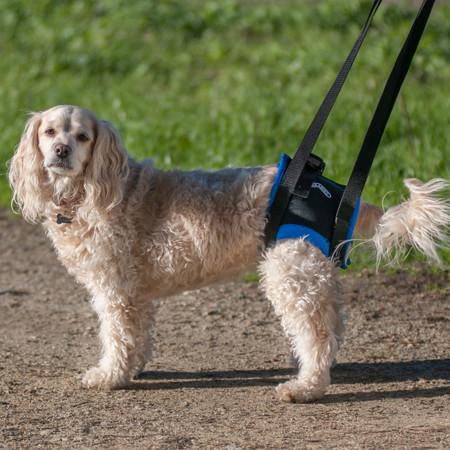
Table of Contents[Hide][Show]
If your pet has IVDD or recurring urinary tract infections, there are two clinical trials for dogs you should consider. I think veterinary clinical trials are an amazing opportunity for dogs with medical problems or physical disabilities. It gives them the ability to take part in cutting-edge technology, with leading veterinary researchers. It also enables participants to contribute to the future health of other dogs. It’s a pretty good deal all the way around.
If your dog has never participated in a clinical trial, there are other benefits as well. Most studies are free of charge to participants. Typically the only cost you pay is the transportation expense to get your pet to the university and back home. A clinical study also gives your dog the potential opportunity to receive a lifesaving treatment or medication that will extend their life.
It’s easy to find a research study. There are 28 accredited schools of veterinary medicine in the USA and all of them continually conduct clinical trials on every system in a dog’s body. That’s a lot of studies to choose from.
The two trials I’m reviewing in this post, are fascinating. Both are being conducted by professors at UC Davis Veterinary Teaching Hospital. Don’t be discouraged if you don’t live nearby; one of the studies wants a mail-in sample.
The first clinical trial is analyzing the effectiveness of a human antibiotic in treating dogs with recurring urinary tract infections. The second study hopes to understand how a genetic component works, in dogs with Intervertebral Disc Disease (IVDD).

Ask & Discover
Get personalized content recommendations and answers drawn from our website. Simply type your question or topic of interest, and our AI assistant will help you find relevant articles, tips, and insights. You can also have a natural conversation to explore topics in more depth.
Study title: Comparing anti-microbial therapies for UTIs in dogs

This study is being conducted by Dr. Jodi Westropp, Professor University of California, Davis.
The purpose of the clinical trial
Urinary tract infections are common in dogs and humans. A single dose antibiotic called Fosfomycin is currently being prescribed for women. It’s an antibacterial drug that comes in the form of a powder that’s mixed with water. Doctors prefer prescribing this medicine, because it works well and because the single dose produces fewer side effects than a multi-day medication. The goal of the study is to see whether or not Fosfomycin is “effective and well tolerated” by dogs.
Participant requirements
Dr. Westropp is looking for these candidates:
Dogs with a current UTI that causes them to strain when urinating
Canines with an UTI that produces blood in the urine
Dogs who urinate only small amounts
Incontinent dogs who respond to antimicrobial drugs for urinary tract infections
The study
Participants will complete a physical exam where urine and blood samples will be collected. In addition, dogs will undergo an abdominal ultrasound. Participants will receive one dose of Fosfomycin, along with two placebo pills, or they’re receive three doses of another antibiotic. Patients will not know which medication they receive.
Pet owners must agree to keep a daily log for 21 days. There will be 5 daily questions to answer.
Apply to the study
If you’re interested in this study, click here and “Take the survey” to see if you qualify.

Get the Essential Guide
The Essential Guide of Products for Handicapped Dogs e-book is a labor of love for me. I wrote it to answer your most pressing questions about where to find the best products for your wheelchair dog. You’ll find products you didn’t know existed and each will improve your dog’s quality of life. Print a copy and keep it by your side.
Study title: Understanding the genetics causing IVDD in Poodles

This study is headed by Dr. Danika Bannasch, Professor University of California, UC Davis.
Purpose of the trial
It’s been discovered that “chondrodystrophic” dog breeds are prone to Type I Intervertebral Disc Disease (IVDD). Type I IVDD causes the discs in the spine to age faster than normal and rupture. It’s painful and can result in paralysis.
Chondrodystrophic (CDDY) dogs have short legs and a long body, like Dachshunds, Basset hounds, Beagles, Corgis and English bulldogs.
CDDY is a genetic abnormality that causes the long bones and cartilage in the legs to remain short. The confusing part about dogs with CDDY is that not every canine with the genetic condition, develops IVDD spine disease.
Poodles are particularly interesting because CDDY varies among the breed. There are both tall Poodles and short ones.
Dr. Bannasch thinks this makes the breed the ideal subject to study. The hope is to determine the risk factors for developing IVDD, by looking at a Poodle’s DNA.
Participant requirements
UC Davis is looking for any poodle who’s been diagnosed with IVDD and underwent surgery for it. The trial needs 4,000 participants.
The study
The only procedure in this clinical trial is a blood sample for DNA analysis. The sample needs to be taken and submitted by your dog’s veterinarian.

My favorite harnesses for disabled dogs.
Apply to the study
To get more information, click here and complete the form titled, “I’m interested in this study.”
Want to read more on these subjects?
Intervertebral Disc Disease: Understanding the Condition
Three Key Elements to Stop Dog Urinary Tract Infections




Please send eny thing that may help and if there’s eny tria
S he can help with
Dale, The story where you left this comment has links to the clinical trial for urinary tract infections and for poodles with IVDD. I can help you research other trials if you explain what problem you’d like to explore for your dog.
Sharon
Hi Sharon
I am looking for a trial for my daushund who underwent emergency surgery on 2/13/23 for IVDD. It has been two weeks and he still has no deep feeling and is paralyzed in his back legs.
Deanna, Sorry, but I don’t know of any new clinical trials at this time. I do, however, recommend that you look at our post about 9 physical therapy exercises you can do at home. Some are made to done soon after surgery. Please check with your vet before starting the exercises, but generally they’re safe. Please don’t give up on your dog’s recovery. The process takes time and most dogs need rehab such as hydrotherapy, laser therapy and PT. You can find stories on all of these subjects by typing the rehab name into our search bar. One thing you do right now is twiddle the end of your dog’s tail. Here are links to PT, hydrotherapy and pain sensations I think you’ll find helpful. https://dogwheelchairlife.com/9-dog-physical-therapy-exercises-you-can-do-at-home/ https://dogwheelchairlife.com/why-hydrotherapy-for-dogs-is-quickly-gaining-popularity/ https://dogwheelchairlife.com/can-my-paralyzed-dog-regain-deep-pain-sensation/
I have a dachshund with IVDD in neck no movement with front left leg . I am in Louisiana working or Georgia you you know of anyone that’s doing studies around these areas. Thanks
Michelle, the closest veterinary school that does research would be the Louisiana School of Veterinary Medicine. I did a quick search and didn’t find any clinical trials for IVDD, but you might want to check and see if you can get on a list. Another research school would be Texas A&M University. I know they were working on a project a couple of years ago.